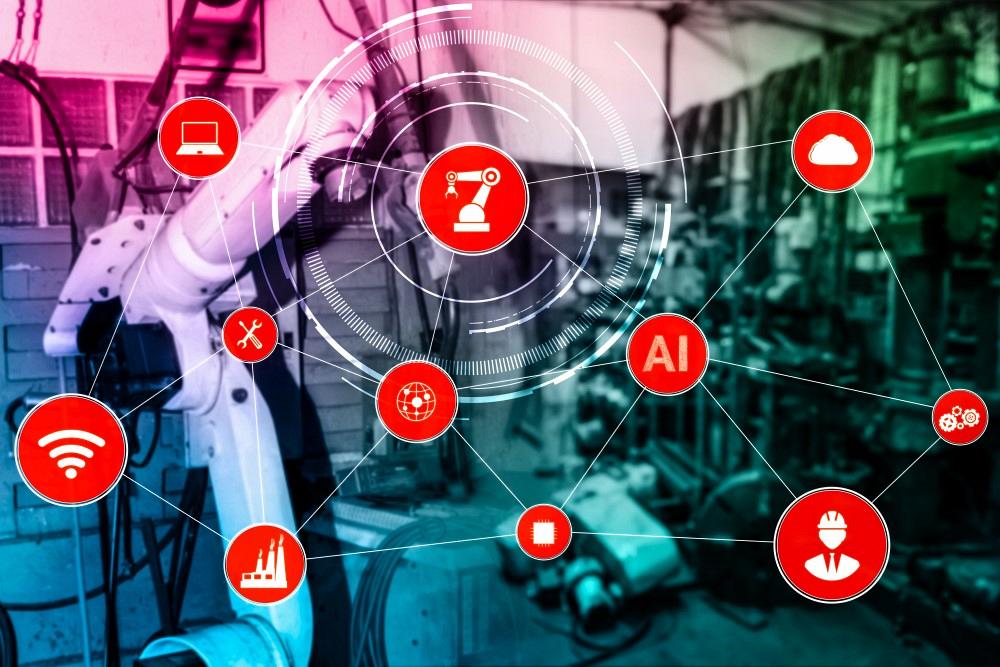Forward from The FABRICATOR
By Bill Frahm
Are metal fabricators ready to implement and maintain this evolving technology?

Before adopting smart manufacturing, you need to evaluate it deeply. NanoStockk/iStock/Getty Images Plus
Should you adopt the latest must-have technology? Smart manufacturing is a daily talking point among manufacturing managers and in related media, and it has the potential to improve manufacturing efficiency, product quality, and workforce learning results. But it also can be costly to implement and maintain, so you need to approach this amazing new technology with your eyes open.
Smart manufacturing is evolving so rapidly that the terminology has yet to catch up, and advertising and media use some terms interchangeably. For the purposes of this article, let’s use the following definitions:
Artificial intelligence (AI) - Networks and techniques to recognize patterns and solve complex problems.
Machine learning – Algorithms that detect patterns in large datasets and adapt their behaviors to learned information.
Smart manufacturing – Use of these and other new and emerging technologies, such as the Internet of Things and big data, to discover events and variables that influence product quality, production efficiency, energy efficiency, and employee safety. The elements of smart manufacturing are statistical analysis and statistical process control (SPC), continuous learning, and discovery of event and property relationships and influences.
Smart manufacturing isn’t an application. It’s a framework to analyze data and support better recommendations and decisions. It can offer tremendous benefit to production results but also presents new resource challenges and introduces new risks.
What you monitor and analyze depends on what you want to invest and your goals for deployment. Successful implementation depends on the knowledge and capabilities of the resources you employ, as well as how well your goals match your company’s real needs.
Before adopting smart manufacturing, you need to evaluate it deeply. Achieving the results you want with this technology demands you answer many questions about your objectives for the implementation.
1. What Is Your Current Production and Financial Situation?
Whatever the size and scope of your smart manufacturing project, the technology has the potential to influence your entire organization. Before you begin planning, evaluate your company’s financial, production, maintenance, and logistical performance. The evaluation will offer insights into areas where smart manufacturing will accomplish the most.
2. What Benefits Do You Expect?
You should explicitly define the objectives for your implementation. This includes a definition of the objectives and how they will be measured.
3. Are You Willing to Commit to Training, New Resources, and a Rigorous Maintenance and Calibration Program?
Smart manufacturing is a significant commitment of time and resources. It requires new hardware, new software, monitoring devices that must be cleaned and calibrated, and a complex network on a noisy plant floor.
In this era of worker shortages, some tout that smart manufacturing can lead to workforce reductions, but you need to understand several staffing realities:
Technology employees are in short supply too. Workers capable of managing a smart manufacturing environment are in high demand. Ask any programmable logic controller programmer about IT resource shortages and constraints.
Plant employees must be trained to work with your new technology.
Employee buy-in will be critical to your success.
4. Who Do You Hire to Implement?
Both industry and technology expertise are required to successfully implement smart manufacturing. Self-proclaimed industry expertise is worthless. You must evaluate the industry knowledge of each contract employee; your consultant won’t do this with the same rigor as your own staff.
You also need to demand continuous communication about both project progress and obstacles from your service providers.
5. How Will You Verify the Integrity of Your Data?
Smart manufacturing thrives on data. It also doesn’t evaluate the quality of that data as well as knowledgeable employees. The sources of data and its security from malicious intent must be monitored and maintained continuously.
6. How Will You Verify the Integrity of Machine Learning Algorithms?
Machine learning includes your software’s rewriting its behavior in response to new knowledge. Even the scientists who create and maintain AI don’t fully understand what happens “under the hood.” Verifying algorithm integrity is one of the biggest challenges in AI. Some things you must be aware of:
Data isn’t neutral and objective. Your decisions, policies, and assumptions are baked into your data. Machine learning algorithms don’t know this and can make recommendations that are less than optimal and may even be counterproductive.
Smart manufacturing isn’t a traditional transaction-based application designed to provide consistent and predictable results. In fact, the results often will be unexpected and a source of new knowledge.
The lack of transparency in AI algorithms remains troublesome. Reviewing these algorithms demands specialized depth of knowledge unavailable in most manufacturing and consulting organizations.
7. What Terminology Will You Use?
You, your suppliers’ salespeople, and supplier consultants must agree on terminology definitions. Terms like Internet of Things, deep learning, big data, unstructured data, and smart manufacturing itself don’t mean the same thing to each person. Standardizing on terminology with your collaborators will provide a solid foundation of understanding on which to build your project.
8. How Well Do You Understand Statistical Analysis Outcomes?
Many smart manufacturing implementations are advanced statistical analysis tools. We can think of them as the old SPC on steroids. Incorporating statistics into your decision-making demands several factors:
Basic understanding of the problem to be solved and the population of data to analyze.
Complete understanding of the population and variables to sample before analysis.
Employee understanding of the product of statistical analysis, as well as its capabilities and limitations.
A willingness to question unexpected results.
Smart manufacturing promises to help manufacturers build quality products, strengthen financial results, and support sustainability. Meeting the promise requires a significant commitment in financial and employee resources. While not new, manufacturing AI remains a bit of the Wild West. To balance out the risks, manufacturers must follow a disciplined approach to development and implementation.


































